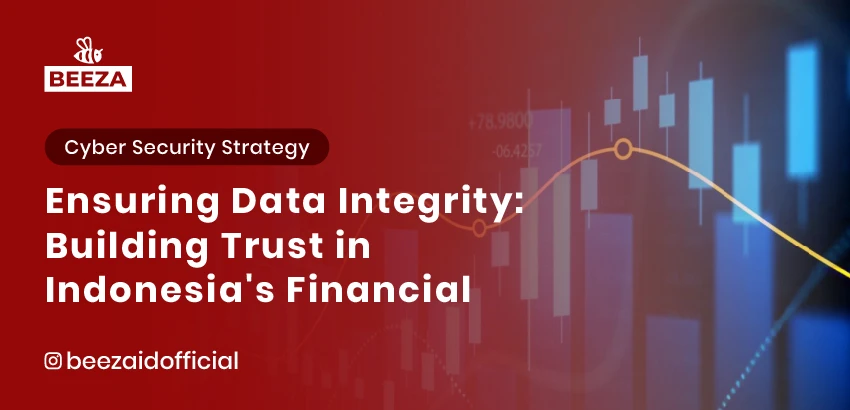
Data integrity is paramount to trust and operational efficiency in the financial sector. As financial institutions in Indonesia increasingly rely on digital technologies, ensuring accurate, secure, and consistent data has become a significant challenge. Amid rising cybersecurity threats and stricter regulations like the Personal Data Protection Law (PDP), maintaining data integrity is no longer optional; it is essential.
The financial sector’s reliance on data extends beyond transactional records to encompass customer identity, credit assessments, and fraud prevention measures. Without robust data integrity, financial institutions risk errors that could undermine decision-making processes, customer trust, and regulatory compliance. As Indonesia’s digital financial landscape evolves, safeguarding data integrity is key to maintaining the sector’s growth and stability.
The Importance of Data Integrity in the Financial Sector
Managing high-integrity data offers more than operational benefits; it is a strategic factor in building long-term trust.
- Enhancing Customer Trust
Trust is the foundation of any relationship between financial institutions and their customers. By ensuring secure and consistent data, institutions can strengthen customer confidence in their services. - Compliance with Regulations
Regulations such as the PDP Law and guidelines from the Financial Services Authority (OJK) require financial institutions to safeguard and maintain accurate customer data. Non-compliance may result in substantial penalties and reputational damage. - Operational Efficiency
The effective integration of data allows for precise analysis, accelerated verification processes, and reduced human error, ultimately enhancing overall efficiency.
Key Challenges in Maintaining Data Integrity
Ensuring data integrity is a critical task that faces challenges in the financial sector. Institutions often encounter the following difficulties:
- Data Fragmentation
Data is often scattered across multiple platforms or branches. This can lead to inconsistencies and hinder data-driven decision-making. - Cybersecurity Threats
Threats such as ransomware and hacking can compromise or steal sensitive information, jeopardizing data integrity. - Outdated Technology Infrastructure
Many smaller institutions still rely on legacy systems that lack the capabilities for seamless data integration.
Technological Solutions for Ensuring Data Integrity
Technology provides a comprehensive solution to the challenges of maintaining data integrity. Key solutions include:
- Blockchain Implementation
Blockchain technology provides tamper-proof data recording, making it ideal for secure and transparent data management. - Artificial Intelligence (AI)
AI can detect data anomalies, assist in risk analysis, and improve verification accuracy. - Data System Integration
Centralizing data from multiple platforms into a unified system ensures consistency and accessibility across the organization. - Cloud-Based Security
Cloud systems offer high-level encryption and flexible access, enabling better data protection.
Case Study: Transforming Microcredit Services with Data Integration
A prominent microfinance institution in Indonesia, focused on empowering small and medium-sized enterprises (SMEs), faced critical operational inefficiencies due to scattered customer data across multiple branches. This data fragmentation not only delayed credit verification processes but also led to inaccuracies in credit risk assessments, resulting in suboptimal decision-making and reduced customer satisfaction.
Challenges Identified
- Data Silos Across Branches
Customer data was stored in disparate systems at various branches, making it challenging to consolidate and access comprehensive information. This hindered timely credit evaluations and created bottlenecks in the lending process. - Inconsistent Credit Risk Analysis
Fragmented data sources resulted in unreliable credit risk assessments. Discrepancies in customer profiles and transaction histories often led to either overly cautious or overly lenient credit decisions. - Prolonged Verification Times
Credit verification processes, which relied heavily on manual data consolidation and review, took an average of three days. This inefficiency caused frustration among SME clients seeking quick financial support.
Solution Approach
To address these challenges, the microfinance institution adopted a strategic and technology-driven approach:
- Cloud-Based Centralized Data Management
A unified, cloud-based system was implemented to centralize all customer data. This enabled seamless access to updated and consistent information across branches. - eKYC Technology
By integrating eKYC (electronic Know Your Customer) solutions, the institution automated and accelerated customer identity verification processes. This technology ensured compliance with regulatory standards while significantly reducing manual intervention. - AI-Powered Credit Analytics
Advanced AI tools were deployed to analyze customer data and improve credit risk assessments. These tools identified patterns and anomalies, providing more accurate and reliable insights for lending decisions. - Process Automation
Workflow automation tools streamlined the end-to-end credit application process, eliminating repetitive tasks and reducing human errors.
Results Achieved
The transformation brought measurable improvements across multiple dimensions:
- Faster Verification
Credit verification times dropped from an average of three days to just a few hours. This expedited process enabled the institution to serve more clients in less time. - Enhanced Data Accuracy
The centralized data system improved data accuracy by 30%, minimizing errors in credit risk assessments and leading to more informed decision-making. - Improved Customer Satisfaction
The institution saw a 15% increase in its customer satisfaction index, reflecting the positive impact of faster and more reliable services. - Operational Efficiency
Automation and AI integration significantly reduced administrative workloads, allowing staff to focus on value-added activities such as client relationship management.
Regulatory Compliance
The implementation of eKYC ensured full compliance with Indonesia’s regulatory requirements, safeguarding the institution from potential legal and financial penalties.
Conclusion
Ensuring data integrity entails more than just technological implementation; it is also essential for cultivating customer trust and attaining operational excellence. Financial institutions in Indonesia can overcome these challenges by leveraging modern solutions such as eKYC, AI, and integrated data systems.If your financial institution is interested in exploring how Beeza’s solutions can help ensure data integrity, please visit Beeza.id for more information.